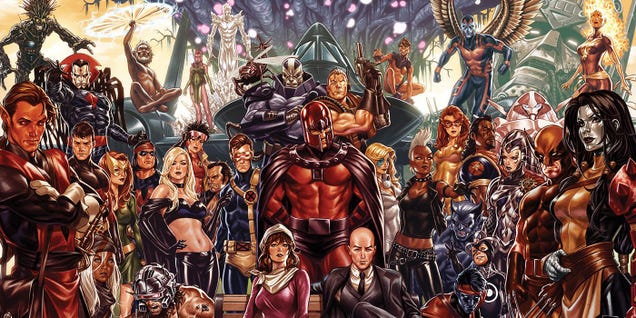Viewers walking out of Wonka this weekend might have their heads spinning, wondering just how this prequel to Roald Dahl’s Charlie Chocolate and the Chocolate Factory connects to the 1971 movie adaptation Willy Wonka and the Chocolate Factory. Sure, there are some visual cues and characters in common, from the eponymous chocolatier with his top hap to his ruthless business rivals Slugworth, Prodnose, and Fickelgruber. And both movies have orange-skinned Oompa Loompas snottily singing about the failures of humans. But how does Timothée Chalamet’s version of Willy end up becoming the reclusive misanthrope played by Gene Wilder?
When Mashable sat down with Wonka co-writer/director Paul King, we asked exactly that. Because as much as this reporter adored this inventive origin story, it left me feeling a sense of dread for what was to come for our sweets-loving hero.
Spoilers ahead for Wonka and Willy Wonka and the Chocolate Factory.
Credit: Warner Bros.
At the end of Wonka, the giddy candyman is riding high, having toppled the chocolate cartel, their sweet-toothed and corrupted police chief, and their cult of chocoholic monks. He’d found a new family, born from the shared oppression of Mrs. Scrubbit’s wash shop. And he’d reconnected downtrodden Noodle (Calah Lane) with her long-lost mother. In the final scene, he’s even teamed with Oompa Loompa Lofty with the dream of building his chocolate factory.
Cut to the ’71 film, where Wonka’s business is booming, but he’s shut out the world to keep the secrets of his sweets from the spying eyes of his rebounding rivals. Wilder’s Wonka is an eccentric and socially awkward man who says strange things about snozzberries and pulls peculiar pranks — like faking a fall. He even appears completely unmoved when greedy children nearly die in his factory. So, how has this sweet dreamer soured so harshly?
Perhaps a sequel to Wonka might fill in the blanks. But for his part, King disagreed with my premise that the first Wonka film suggests its titular entrepreneur has grown bitter.
“I felt like he’s a very sad, broken character at the beginning of [the ’71 film],” King explained, “but there’s a real spirit of generosity and hope to what he’s doing — sending out these golden tickets, looking for a connection and a decent human in this wicked world.”
The English filmmaker also acclaimed for Paddington and Paddington 2 noted his Wonka ends about 25 years before Willy Wonka and the Chocolate Factory, in part because Wilder’s broken beginning didn’t seem like “a good place to land the character” for this film.
“But I was really interested in that spirit of generosity of this character, who is an optimist at the end, really,” King said, emphasizing that the absurdity of the candymaker’s scheme speaks to his core nature. “Like, sending out five tickets and finding five children and thinking one of them’s worth giving your life’s work away to? For all of the jagged edges, there’s a real hope and sincere kindness there.”
Credit: Wolper / Warner Bros / Kobal / Shutterstock
Watching Willy Wonka and Wonka back-to-back, it’s easy to see where King drew some parallels to the earlier film’s characters and his own. In King and co-writer Simon Farnaby’s screenplay, they give Willy an origin similar to Charlie Bucket, a joyful and impoverished kid who was devoted to his single working mother. Within the context of Wonka, Wilder’s Willy might well see himself in that plucky young boy.
King noted how he and Farnaby borrowed a line from David Seltzer’s Willy Wonka script for their own, such was its importance to the character: “So shines a good deed in a weary world.” In the earlier film, Willy says this softly after Charlie — accepting he’s lost the prize for his Fizzy Lifting Drinks shenanigans — has lost. He returns the Everlasting Gobstopper Willy gave him, and from there spills poetry.
“It’s so beautiful, that scene,” King said. And to him, the turn Willy has from there is crucial to understanding his character. Even after decades of battling with business rivals and facing deception from human employees and children, Wonka wants to believe in the goodness in people. In Wonka, we see him inspiring others to pursue their dreams of finding freedom, family, and love. In Willy Wonka, we see Charlie Bucket bring Willy back from the brink of hopelessness.
In that final sequence of Willy Wonka and the Chocolate Factory, it’s not just Charlie who wins. Willy is reborn and joyous in a way we haven’t seen him in the whole movie. In the end, Wonka rescues Charlie. Strike that — reverse it. And remember the words Wonka says as he hugs Charlie, his protege: “Don’t forget what happens to the man who got everything he wanted — he lived happily ever after.”
Paul King offers some sweet food for thought in this interview about how “Wonka” connects to Gene Wilder’s “Willy Wonka and the Chocolate Factory.” Read More Mashable

